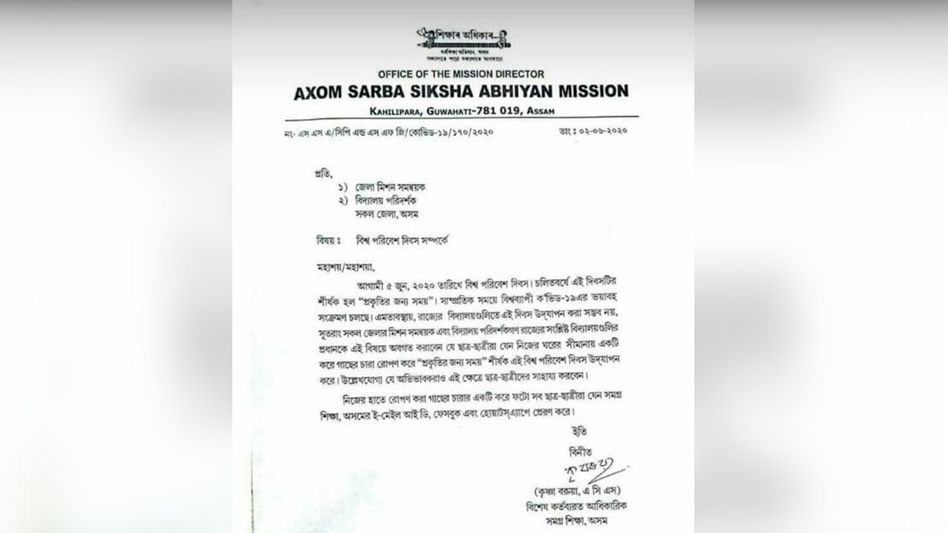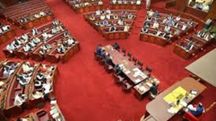Assam: Sarba Siksha Abhiyan Mission’s advisory in 'Bangla' faces flak
 Assam: Sarba Siksha Abhiyan Mission’s advisory in 'Bangla' faces flak
Assam: Sarba Siksha Abhiyan Mission’s advisory in 'Bangla' faces flakA directive issued by the Office of the Mission Director, Axom Sarba Siksha Abhiyan Mission, has drawn strong resentment across Assam. This came even after the state government had made it compulsory to use the Assamese language as the official language as a face-saving measure post CAA.
The directive, in the Bengali language, has asked the school inspectors and the district mission coordinator to advise the students to plant saplings at their respective homes this World Environment Day on June 5th, 2020. Ironically the directive was signed by Krishna Barua, ACS, Officer on Special Duty (OSD) and was issued to all the school inspectors and the district mission coordinators.
This has created an uproar in the Assamese civil society who have objected to the use of the language as a form of instruction. The All Assam Students’ Union, said that the incident was unfortunate and directed their energies towards the state government. “The Chief Minister Sarbananda Sonowal-led BJP government, which came to power to protect the Jati, Mati and Bheti have failed to protect the Assamese language and the community. It was the government’s duty to closely monitor everything,” AASU chief advisor Samujjal Kumar Bhattacharya told Inside Northeast.
Meanwhile, the Krishak Mukti Sangram Samiti (KMSS), has condemned the incident and alleged that the officer in charge Krishna Barua, has kneeled down before the higher-level officers such as Mission Director B Kalyan Chakravarty by ‘compromising own identity’.
Also read: Rising Cases In Assam Reveal State’s Corona Pattern
“It is not for the first time that such kind of irresponsible thing has been done by the state government departments. It is unfortunate. The government must take an immediate step in the matter,” Mukut Deka, KMSS joint general secretary, said while urging the Sarba Siksha Mission to publicly apologies and withdraw the advisory. He further added that the officer should have staged a protest to sign the advisory in Bengali.
KMSS extended the matter into the macro issue of the statewide agitation against the implementation of the Citizenship Amendment Act 2019, “the saffron party-led government has been continuously working against the state and the greater Assamese community since it came to power. Implementation of the Citizenship Amendment Act can be cited as an example of that. It has failed to protect the community at large and its language and culture,” said Deka.
Matter to be scrutinized
Meanwhile, the Assam Sahitya Sabha, the literary body of Assam, to promote the culture of Assam and Assamese literature, said that the matter should be scrutinized before commenting anything.
During a telephonic conversation with Inside Northeast, the president of the organization and the former Director-General of Police (DGP), Assam, Kuladhar Saikia said, “It would not be fair to make any remark in the matter before scrutinizing it. We will be able to say something once we are confirmed with it.”
Also read: Assam Floods Wreak Havoc On Agriculture Amid Corona
Sharp reaction on social media
Meanwhile, netizens have sharply criticized the matter questioning whether there any pressure from the higher authority on the ACS officer to sign the advisory in the Bengali language. They also expressed concern over the existential identity of the Assamese language under the regime of the government which came to power by shouting the Jati, Mati and Bheti slogan in the 2016 Assam Legislative Assembly elections.
Repeat of the dark phase of Assamese language?
The mass censure by the concerned citizens over this matter has been generated due to a historical hangover that dates back to colonial times. The Dark Age of the Assamese language is a 37-year-long time-frame, from 1836 to 1873, during which Bengali eclipsed the Assamese language. During British India, the Bengali language was imposed over the Assamese as the British took over Assam. The clerical and technical workers that they brought were Bengali, allegedly in order to impose Bengali as the medium of instruction in schools and colleges, and for all official purposes. Until, Nathan Brown, an American Baptist missionary to India, aimed at restoring the Assamese language along with regional leaders to avoid it being completely overtaken by the Bengali language. In order to restore the Assamese Language, he took the matter to the British India administration of the time. Eliza Brown, Nathan's wife, was his partner in this mission.
Grey areas
As per sources, the notification was issued in English, Hindi, Assamese and Bangla language by the Mission. If that is true, then why the Mission did not issue the same notification in Bodo language since it is one of the 22 scheduled languages that is given a special constitutional status in India. Moreover, it is the official language of the Bodoland Autonomous region and co-official language of the state of Assam. To comment on that aspect, B Kalyan Chakravarty, the Mission Director, did not respond to any call despite Inside Northeast tried to get connect him repeatedly over the phone.
Readers like you make Inside Northeast’s work possible.
To support our brand of fearless and investigative journalism, support us HERE.
Download:
The Inside Northeast app HERE for News, Views, and Reviews from Northeast India.
Do keep following us for news on-the-go. We deliver the Northeast.
Copyright©2026 Living Media India Limited. For reprint rights: Syndications Today









